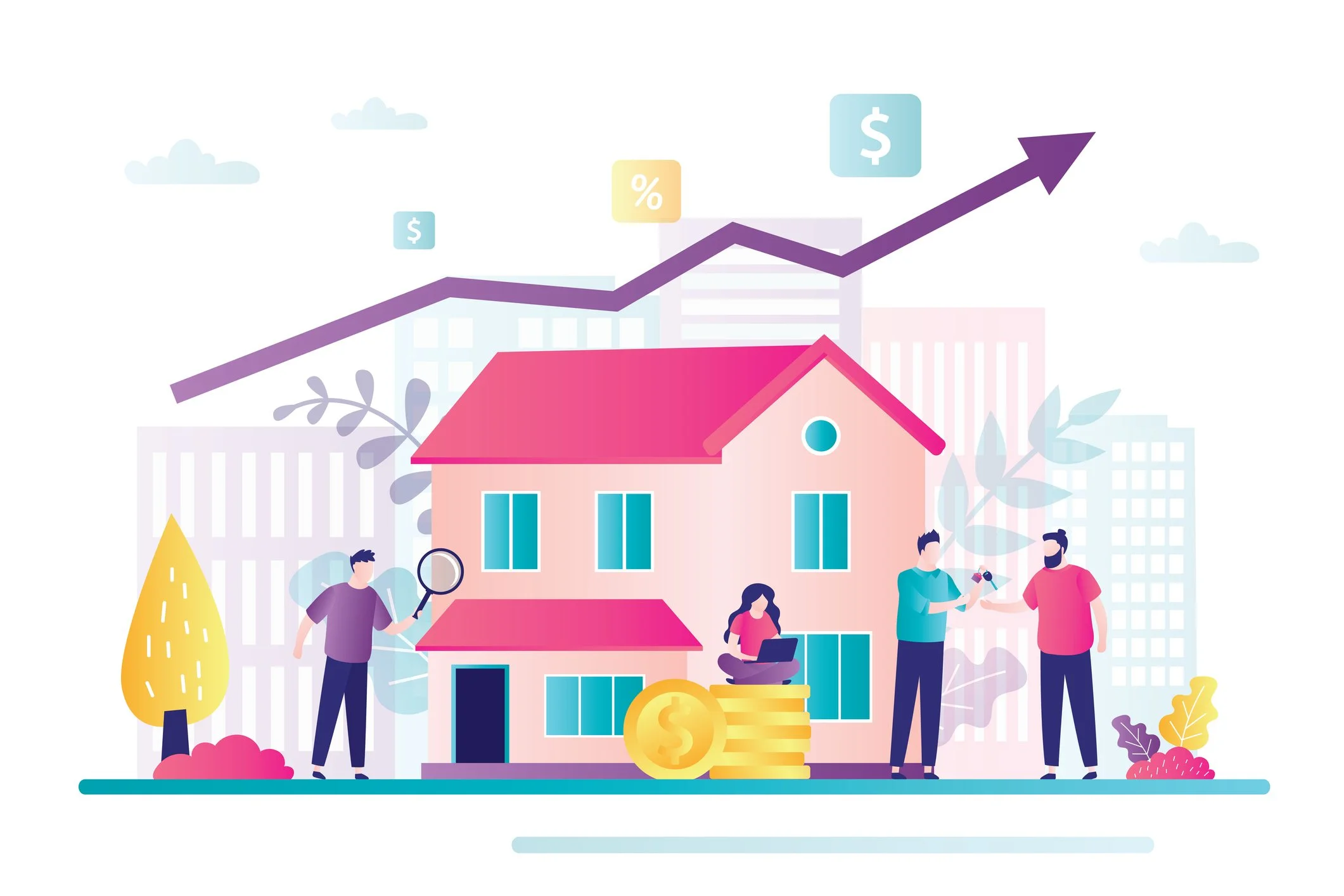What is a Debt-to-Income (DTI) Ratio?
Curious about the Debt-to-Income (DTI) Ratio associated with mortgage applications? Learn more here!
On your pathway to homeownership you may have encountered the term DTI or debt-to-income ratio and wondered what it means. And why it is so important for getting a mortgage? Get answers here along with tips on how to include your convenient HousePlant Loan or Gift documentation in your mortgage applications.
What is a DTI?
DTI stands for debt-to-income and is calculated as a ratio. Lenders evaluate your DTI ratio when they are reviewing your mortgage loan application.
What is a debt-to-income ratio?
DTI stands for debt-to-income and it is a ratio created by dividing your monthly debt payments by your gross monthly income (income before taxes).
Your DTI ratio is the percent of your monthly income that you spend servicing your debt.
Lenders use your DTI ratio to assess your ability to service a perspective loan and qualify you for a loan.
What is counted in the DTI ratio?
When calculating your DTI ratio, lenders are trying to figure out what your debt responsibilities would be relative to your monthly income if they gave you the mortgage to ensure they are not giving you a loan you won’t be able to service.
Debt
Your debt in the DTI ratio when seeking a new mortgage is comprised of your monthly debt servicing responsibilities would be if they were to grant you a mortgage. So it includes your future mortgage payments and home related expenses like property taxes and homeowners association fees but not whatever you pay currently as long as you intend to sell or stop renting your existing residence. You can calculate your prospective housing costs using HousePlant’s calculator.
In addition to housing payments any recurring monthly debt payments are counted as debt in a DTI ratio. This includes but is not limited payments towards servicing student loans, car loans/leases, personal loans, child or spousal support, and credit card debt. Crucially if you receive a loan from a friend or family member through HousePlant that would be counted as part of your debt. Fortunately, HousePlant makes tracking and providing documentation of this social loan easier than ever.
If you intend to sell your car or your lease is ending soon and you don't intend to get a new one or you only have a couple months of payments left, those payments generally are not counted towards your debt because they aren’t going to be recurring and won’t affect your ability to service your new mortgage.
Income
Income is a bit more straightforward. For DTI ratio purposes it can be considered any money you receive in a month before taxes. For most people this will just be their salary but it can also include money you make from side gigs, dividends, spousal support, etc. One off payments, like gifts for your birthday, generally are not included because they are not reflective of your typical monthly income.
If your income is more inconsistent, your income in your DTI should be based off what you can expect in a typical month or a long term average rather than your highest grossing month.
What is a good DTI ratio?
Lenders prefer a lower DTI because it means that you are more likely to be able to service it and weather any fluctuations in income and expenses. Lower DTI ratios are considered less risky and lenders may charge borrowers with higher DTI ratios higher rates because there is a higher risk of default.
What DTI ratio banks consider good varies by bank and circumstances, but as a rule of thumb suggests that prospective borrowers should keep it below 36% with less than 28% going towards servicing a mortgage.
It is not impossible to get a mortgage if your DTI is higher you’ll likely have less options for lenders and pay higher rates. Having a lower DTI also does not guarantee you’ll be approved for a mortgage.
How to improve your DTI ratio:
A lower DTI ratio can make you more appealing to lenders and there are two ways to lower your DTI ratio: decrease your monthly debt payments or increase your income.
The DTI ratio typically measures the monthly cost of servicing your debt not your outstanding debt so depending on your financial circumstances it may make sense for you to restructure your loans to reduce your monthly payments for the sake of lowering your DTI. You could also pay off some of your debt which would likely increase your credit score which would help you get a better rate however doing so might also drain some of the savings you need to buy a home.
Increasing your monthly income is much easier said than done but for some homebuyers it may make sense to pool with friends and seek a mortgage together.
DTI ratios and social loans and gifts from HousePlant:
Social loans, like any other kind of debt that is serviced monthly, are counted as debt in a DTI ratio.
It is important to consider the impact any borrowing to pay for your down payment may have on your DTI ratio and discuss it with whoever you are borrowing from.
On the other hand, gifts generally will not be counted as income because they are not recurring. Gifts under $16,000 do not trigger required IRS-mandating reporting and taxes.
Disclosing Loans in Mortgage Applications:
You may be tempted to avoid counting debt from any social loans by either not reporting it or reporting the large deposit as a gift so that it does not hurt your DTI but this can actually get you in massive trouble both with the lender and legally.
Mortgage lenders want to make sure you are going to be able to pay off your mortgage and will scrutinize your bank statements. Any large unexplained deposits may raise suspicions because your bank wants to know if those payments are going to be recurring, if you have some obligation to pay them back or if fraud was involved.
While there is not a universal standard, most lenders will require you to report to them the source of your down payment funds and any large deposits. What constitutes large is up to the lender's discretion but generally it is better to err on the side of caution.
If you did borrow money to pay for your downpayment, lenders are going to want to see the terms and evidence of that agreement. Not reporting a personal loan when seeking a mortgage can be mortgage and/or loan fraud which is not only illegal but can also put you at risk of not getting a mortgage in the future regardless of how good your financials are.
Important Tip for HousePlant Users: We also highly recommend depositing HousePlant-facilitated loans and gifts from friends and family as soon as you can. Why? As a prospective homebuyer, you ideally want the funds to be settled in your savings account for at least two billing cycles before your mortgage application and documents are submitted. The funds you’ll use for your downpayment that have been deposited your accounts for 60 day are more are called seasoned funds and are much easier for your lender to review and process along with the full documentation.
How HousePlant makes documentation easy:
Thankfully, HousePlant makes reporting a lot easier. When you set up a page on HousePlant you are inviting people to give you an offer for a loan or gift that you can put towards your down payment. When you accept an offer for a gift or personal loan on HousePlant you will receive a PDF copy of your loan or gift agreement & details that you can provide to your lender to prove the source of your funds.
Conclusion
At the end of the day, a bigger down payment is a bigger down payment which has benefits for all stakeholders. HousePlant makes it easy to crowdfund and document social loans and gifts from loved ones who want to support you as you buy a home! Be sure to deposit funds as soon as you accept offers, and ideally 60 days or more before your application.
When you do submit your documents in your mortgage application, it’s easily to include Loan Agreements and Gift Acknowledgement PDF letters which are automatically generated for each Agreement you make on HousePlant. Share these your mortgage broker in order to properly disclose the sources of all funds in your down payment for a smoother process.
Good luck homebuyers, we are here for you!




